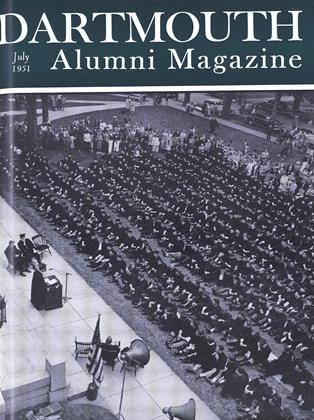THE annual meeting of the General Association of Dartmouth Alumni was held Saturday, June 23, following a buffet luncheon in the gym. In attendance were reuning alumni, members of the Alumni Council, and officials of the College. Robert P. Burroughs '21, vice president of the Association, presided at the meeting, and other speakers included Sidney C. Hayward '26, Secretary of the College, President Dickey, and Governor Sherman Adams '20 of New Hampshire, who spoke on behalf of the Classes of 1920, 1921 and 1922.
The following Association officers were elected for 1951-52: President, Charles L. Hardy '27 of Chicago, president of the Joseph T. Ryerson and Son Company, steel distributing corporation; Vice Presidents, Mansfield D. Sprague '33 of Bridgeport, Conn., and John B. Martin '31 of Grand Rapids, Mich.; and Secretary, Sidney C. Hayward '26 of Hanover. Mr. Sprague is Speaker of the Connecticut House of Representatives and a partner in the Bridgeport law firm of Boardman, Stoddard and McCarty. Mr. Martin is Auditor General for the State of Michigan and a partner in the law firm of Bidwell, Schmidt and Martin.
Carleton Blunt '26 of Chicago was named chairman of the executive committee and in that capacity will also serve on the Alumni Council. Other executive committee members are Edward B. Red- man '06 of New York City, H. Richardson Lane '07 of Boston, Laurence H. Symmes 'OB of New York City, Henry K. Urion '12 of New York City, Michael H. Cardozo '32 of Washington, D. C., and James L. Farley '42 of Claremont, N. H.
One of the highlights of the meeting was the talk by Governor Adams. In discussing Dartmouth's present-day role, he said in part:
"Dartmouth's work has always been, and still is, not so much to persuade, as it is to teach men to have convictions and the fullness of life which comes from relying upon them. The serenity and strength which have been gained from these experiences which are within recollection of every Dartmouth man give him the bloom of its vigor and a vision of the greatness to which he might strive.
"Dartmouth matters most, I think, when it can fount so many who have engaged in what Milton called 'the world's great work.' Its sons have swung their flails through all manner of conflict, heartbreak, novelty, futility, unbearable monotony, and the bright gleam of triumph. Slowly and surely the golden grain of accomplishment has been threshed out. We know, even with the vicissitudes of a changing world, with new men from new environments, that the answer to the question which President Dickey has asked—'how much does Dartmouth matter?'—lies in new generations of Dartmouth men, all of whom have the opportunity to help raise the standards of human intelligence, and obtain a true understanding of how, as Milton put it, we are 'to settle order once again.'
"Even as it was a son of Dartmouth who defended and preserved the charter of this college, and the constitution of this Republic; even as generations of Dartmouth men have accepted the world's work as their great opportunity; so it is within the grasp of the fellowship of Dartmouth men to reach beyond the old challenges and the old opportunities to the really great tasks of settling order in the world of hate and despair, disorder and disillusion As long as Dartmouth will teach the importance of putting things where they belong, and teaching men to know what they are talking about, Dartmouth will always matter."
 View Full Issue
View Full Issue
More From This Issue
-
 Class Notes
Class Notes1921 Has A Lively 30th
July 1951 By REGINALD B. MINER '21 -
 Article
ArticleThe 1951 Commencement
July 1951 By C.E.W -
 Class Notes
Class Notes1911 Has a Memorable 40th
July 1951 By NATHANIEL G. BURLEIGH '11 -
 Article
ArticleBaccalaureate Address
July 1951 By DR. REINHOLD NIEBUHR -
 Class Notes
Class Notes1926 Holds "Terrific 25th"
July 1951 By PAUL VENNEMAN '26 -
 Class Notes
Class Notes1941 Weathers Its Big 10th
July 1951 By FRANK M. HALL '41








